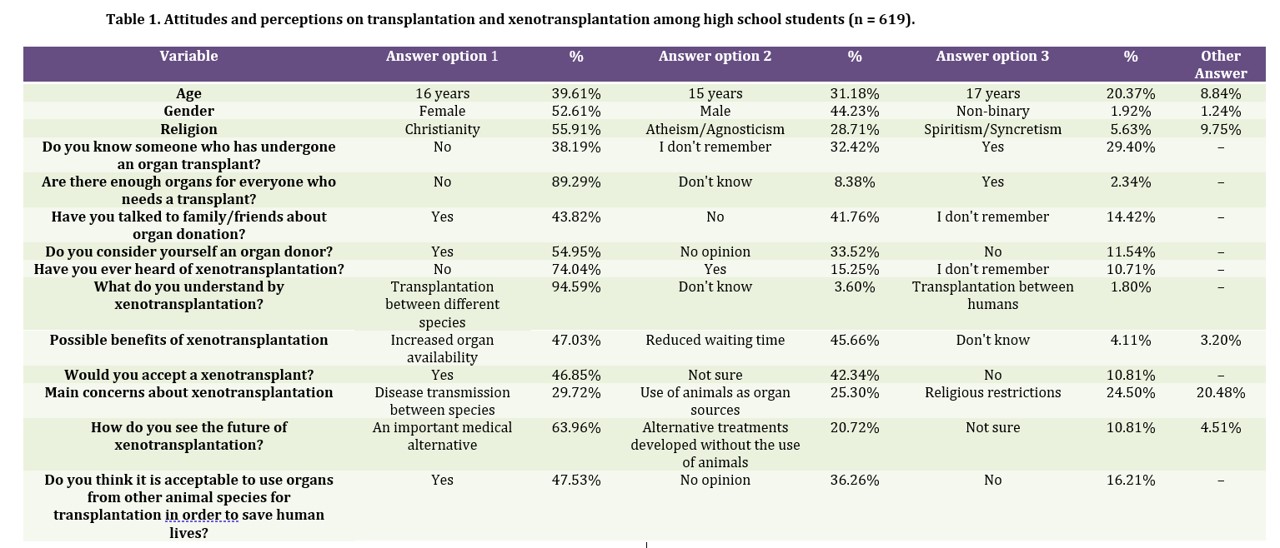Profile and attitudes of high school students (São Paulo city, Brazil) toward xenotransplantation
Karina Oliveira-Braga1,2, Luciano A Brito2, Michelle S Araújo2, Ligiane O Leme2, Vitor Leão2, Julia S Cassim2, Taina S Bicalho2, Ludmila V Garcia2, Luiz Gustavo C Munhoz2, Gabriel H Santos 2, Mayana Zatz2, Silvano M.A. Raia2, Ernesto Goulart 2.
1Laboratório de Pesquisa em Cirurgia Torácica - LIM61, Instituto do Coração da Faculdade de Medicina da Universidade de São Paulo, São Paulo , Brazil; 2Genetics and evolutionary biology, Human Genome and Stem Cell Research Center, Institute of Biosciences, University of São Paulo, São Paulo, Brazil
Xenotransplantation has emerged as a potential alternative to address the global shortage of human organs for transplantation. This study investigated the attitudes of Brazilian adolescents toward xenotransplantation and the factors associated with its acceptance or rejection. The research was conducted in São Paulo, Brazil, a region where xenotransplantation research is currently advancing.
A structured questionnaire was administered to 619 adolescents aged 15 to 17, collecting demographic, educational, and perceptual data regarding organ transplantation and xenotransplantation. The variable “Xenotransplantation Attitude” was constructed based on respondents’ willingness to receive an animal organ and their ethical evaluation of the practice. Only participants who reported prior knowledge of xenotransplant were included in this portion of the analysis. Associations between variables were tested using Fisher’s exact test for categorical variables and the Mann-Whitney U test for age, with a significance level of 5%.
Most adolescents (74.04%) had never heard of xenotransplantation. Among those who had, 94.59% correctly defined it as transplantation between species. The study found that nearly half of the adolescents (47.5%) demonstrated a positive attitude toward xenotransplantation. In contrast, 5.9% showed a negative attitude, and 46.6% either had no opinion or lacked sufficient knowledge on the subject.

Statistical analysis revealed that a positive attitude toward xenotransplantation was significantly associated with the participants' perception of the future of the technique and their age. Adolescents who viewed xenotransplantation as a promising medical alternative were more likely to express favorable attitudes, suggesting that trust in the potential of the technique directly influences its acceptance (p = 0.01). Age also proved to be a distinguishing factor, with statistically significant differences observed between groups (p = 0.004). Factors such as gender, religion, and knowledge of allotransplantation showed no significant association with xenotransplantation attitude.
Despite limited prior knowledge, adolescents showed openness to xenotransplantation, acknowledging its potential benefits while expressing ethical and biological concerns. The high rate of uncertainty regarding both personal acceptance and ethical judgment underscores the need for educational initiatives that promote informed and critical discussion of the topic. Considering the current progress in xenotransplantation research in Brazil, especially in São Paulo, building a well-informed public perspective will be essential for the future development and societal acceptance of this medical innovation.
São Paulo Research Foundation (Fapesp) - grant number 21/11872-5; National Council for Scientific and Technological Development (CNPq) - grant number 444075/2023-2.
[1] Xentotransplantation
[2] Ethics
[3] acceptance